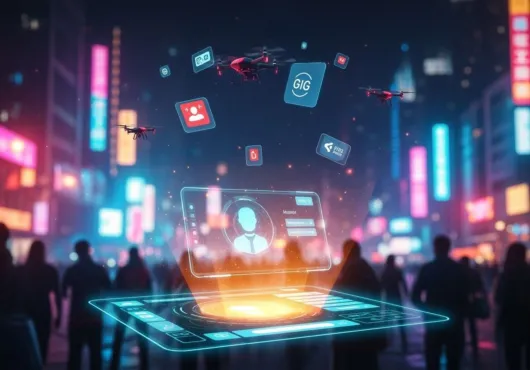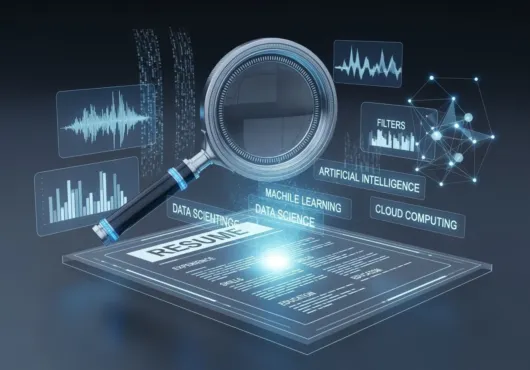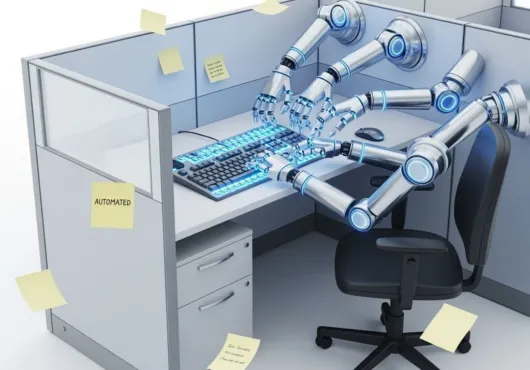Another headline screaming about robots stealing jobs. Same fear, different day. Maybe it’s on your feed, maybe your cousin reposted it, maybe it’s just background noise now. Either way, you want the truth. Fair. Let’s get to it.
AI Is Going to Take Everyone’s Job
Reality:
AI is not a sentient factory manager with a grudge—it’s software. What it actually does is reshape work. That means some jobs vanish, yes—but others change, and new ones pop up that didn’t exist five years ago.
Think: prompt engineers, AI ethicists, chatbot behavior trainers. And then think about how many people now spend their days telling ChatGPT how to write LinkedIn posts. It’s a shift, not an extinction.
Hot Take:
AI isn’t taking your job—capitalism is. The tech just quickens it.
Only Some Careers Are Getting Axed
Reality:
That’s cute. But no. AI doesn’t care if you wear a hard hat or a designer suit. If your job involves pattern recognition, repetition, or data wrangling, it’s on the table.
That means radiologists, lawyers, coders, and content creators all have a seat on the same anxiety train as factory workers. White collar, meet algorithm.
Hot Take:
“Low skill” is just a euphemism corporations use until the software replaces your job.
AI Will Free Us for More Creative Work
Reality:
That’s the fantasy, right? Let the bots handle the boring stuff so humans can paint murals and write poetry. But in practice? Most companies just use AI to crank out more content, faster, cheaper—and then expect the humans to do even more.
Your “creative freedom” might just be more Slack messages and tighter deadlines. Not exactly a utopia.
Hot Take:
AI isn’t giving you time to be creative—it’s giving your boss time to forget you exist.
Upskilling Is the Answer
Reality:
Sure, learning new tech helps. Except most people don’t have the time or money to reinvent themselves every 18 months. Plus, it doesn’t fix the bigger issue: jobs are being redesigned. And not everyone gets a seat in the new org chart.
Hot Take:
“Just upskill” is the new “pull yourself up by your bootstraps”—great advice, if you already have the boots.
AI on The Playing Field
Reality:
In theory, AI democratizes access to tools and knowledge. In reality? The people building and deploying it are still mostly rich, mostly white, mostly male—and they’re building systems that scale their worldview.
Bias in. Bias out. And now it runs at lightning speed.
Hot Take:
AI isn’t breaking the system. It’s scaling it—with better fonts.
AI Will Replace Jobs, Not People
Reality:
Semantics. When your job is automated, you’re still out of work. Whether it’s one task or the whole workflow doesn’t matter if you’re no longer on the payroll.
Also: when AI replaces tasks, it often means workers are replaced by freelancers, contractors, or machines with a smaller line item on the balance sheet.
Hot Take:
A job “restructured by AI” is just corporate-speak for “we found a cheaper way to do it.”
Tech people are the safest.
They aren’t. The tools that build AI can build themselves now. Coders aren’t gods anymore—they’re middle management for machines. And the truth is, executives will fire a developer faster than a barista if it saves them budget. Loyalty doesn’t scale.
It’s too late to adapt.
Not true. You’re not trying to out-code the machine—you’re trying to out-human it. That means being able to read the room, think creatively, and question the premise. Skills the machine can’t quite fake yet. If anything, this is the perfect time to pivot.
This is different from every tech wave before.
It’s not. We saw this with the internet, with automation, with globalization. Panic, restructuring, noise—and then people adapt. What’s different now is the speed. But the playbook’s the same: don’t freeze.
Final Word: What To Believe
Yes, AI is changing work. Yes, it’s disruptive. But no, it’s not an all-knowing villain—or a magical productivity unicorn. It’s a tool being wielded by power, money, and market forces. That means how this plays out isn’t about the tech—it’s about the people who profit from it.
You don’t need to fear AI. You need to understand who’s steering it, who benefits, and who gets erased. That’s not a job for machines. That’s a job for all of us.


